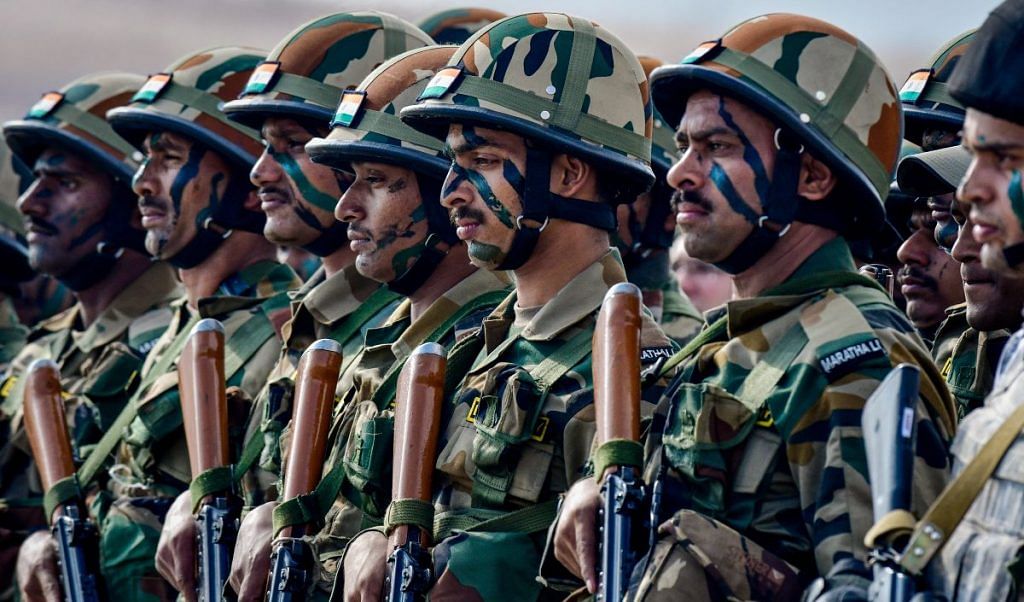Indian Army is one of the most secular institutions in the country and Muslims must sign up.
It’s like stepping into a veritable minefield if you speak about the representation of Muslims in the Indian military. But the trigger for this piece is an article in ThePrint, which said Indian Muslims are increasingly trying to stake a claim in the power structure by applying for civil services jobs like the IAS, IPS and IFS.
There is no better example of this than in the state of Jammu and Kashmir where young educated people are working hard to realise their ambitions through the Indian Civil Services. This can also help alter public perception about the Muslim community especially because there are no reservations for minorities.
There are no reservations in the Indian armed forces either, for minorities or SCs/STs. What exists is a unique representation system, which is regionally balanced and based on what is referred to as the recruitable male population index (RMPI). It’s a slightly complex system, which ensures regional distribution but no bias towards any faith or caste. This exists in the level below the officers’ cadre.
Also read: India’s young Muslims are taking the IAS, IPS route to get a share of power
At the officer level, it is simply open competition – those who are competent will be selected. This can lead to concentration of better educated, more aware and already empowered youth to apply and be selected through fair competition leading to a preponderance of some segments in the officer cadre; no issues with that, the best deserve the cake.
The question is about motivating the less-aware youth with lower education levels to equip themselves to compete for the officer cadre. Entry in even slightly enhanced numbers will have an exponential social empowerment effect on the ground and that is most desirable. All of this can be achieved without any dilution of standards whatsoever.
My frequent travels and interaction with less-fortunate segments of the Muslim community is for the sole purpose of patriotic motivation and promotion of self-confidence to avail of every opportunity that India offers. Unfortunately, Muslim youth lack motivation and confidence, and worse, still consider the armed forces as something outside their ambit. Living in dense clusters in walled cities, their lack of exposure has severely hampered growth and awareness.
When I identify myself as a General Officer of the Indian Army, whose father was also a General Officer in the same Army and had volunteered to stay and continue serving that Army when he was offered a choice in 1947, I expect it would be a matter of great pride for them. After all, both are highly decorated by the President of India. It’s not scorn that comes my way but utter disbelief.
“How can you be a General?” one young skull cap-wearing youth asked me. “There is no place for Muslims in the Indian Army.” It is stunning that such perception still prevails in India, 71 years after Independence. It is, after all, a question of awareness. The average Muslim family from a mofussil town considers the Indian Army completely alien with the perception that its culture does not permit a good religious Muslim to practice his/her faith. Little is it known that the practices of the Indian Army actually make most of them even better Muslims and infuse a sense of professional achievement.
Also read: India needs jobs for all, including its Muslims
India’s Muslims need to be made aware that the Indian Army is the only Indian institution which has an Institute for National Integration (INI) for the promotion of plurality, tolerance, integration and multi-faith existence. The fear that they cannot pray at will, cannot fast, and cannot consume the meat of their preference is a misnomer. A Muslim subunit of the Grenadiers regiment is almost always commanded by a non-Muslim. That officer keeps all 30 fasts of Ramzan with the troops and leads their prayers five times a day. Meat dressed to their preference is almost invariably provided to them; if there are constraints at times, an equivalent calorific value of protein will be provided through alternatives such as fish, eggs or milk.
Wherever 120 Muslims are present the rule is that a religious teacher will be posted for religious guidance – and this applies to all religious communities. The teacher will accompany them through hell and high water. Wherever a subunit of Muslim troops stay, a masjid will be mandatory just like a temple, church or a gurdwara. If Muslims, whatever their number, are present in a mixed All India All Class unit, there will be a Sarv Dharm Sthal (all faiths under one roof) with troops being continuously preached on the virtues of multi-faith existence in the spirit of true India. All this is for the troops and is a demonstration of the Army’s secular and tolerant culture.
For officers, there is only one rule – follow your own faith, but the faith of the soldier you command becomes the faith of the officer. I remained a Muslim but participated in the Hindu practices with my troops. No sensible Muslim can ever object to that. My men cared more for my sensitivities than I did.
Also read: The Muslims voting for the BJP are richer, more educated and conservative
Cricket, Bollywood, IT and now even civil services have broken the bastion of Muslim backwardness in India. Muslim youth seek opportunities everywhere but hold back from the officer cadre of the Indian armed forces. Perhaps the uniform instils a fear of the unknown.
The armed forces can contribute immensely toward strengthening India’s social fabric. Imagine a young Muslim Major from the Garhwal Rifles becoming the icon for his town or mohalla around Sultanpur or Barabanki. That’s the India I seek.
The author, a former GOC of Srinagar-based 15 Corps, is associated with the Vivekanand International Foundation and the Institute of Peace and Conflict Studies. He is the Chancellor of Central University of Kashmir.
